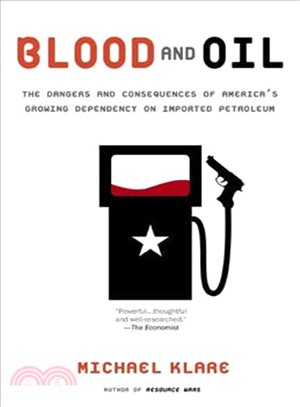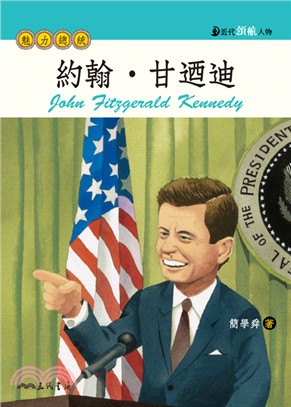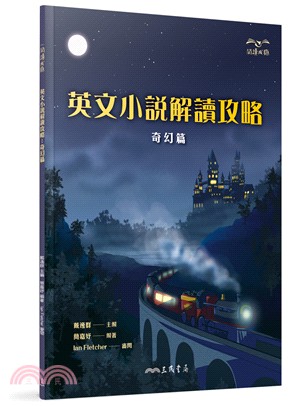Blood And Oil: The Dangers And Consequences of America's Growing Dependency on Imported Petroleum
商品資訊
ISBN13:9780805079388
出版社:Owl Books
作者:Michael T. Klare
出版日:2005/08/01
裝訂:平裝
商品簡介
作者簡介
相關商品
商品簡介
In his pathbreaking Resource Wars, world security expert Michael Klare alerted us to the role of resources in conflicts in the post-cold-war world. Now, in Blood and Oil, he concentrates on a single precious commodity, petroleum, while issuing a warning to the United States—its most powerful, and most dependent, global consumer.
Since September 11 and the commencement of the "war on terror," the world's attention has been focused on the relationship between U.S. foreign policy in the Middle East and the oceans of crude oil that lie beneath the region's soil. Klare traces oil's impact on international affairs since World War II, revealing its influence on the Truman, Eisenhower, Nixon, and Carter doctrines. He shows how America's own wells are drying up as our demand increases; by 2010 the United States will need to import 60 percent of its oil. And since most of this supply will have to come from chronically unstable, often violently anti-American zones—the Persian Gulf, the Caspian Sea, Latin America, and Africa—our dependency is bound to lead to recurrent military involvement.
With clarity and urgency, Blood and Oil delineates the United States' predicament and cautions that it is time to change our energy policies, before we spend the next decades paying for oil with blood. Michael Klare is the director of the Five College Professor of Program in Peace and World Security Studies at Hampshire College in Amherst and the author of Resource Wars. The defense analyst for The Nation and NPR, he lives in Northampton, Massachusetts. In his pathbreaking Resource Wars, world security expert Michael Klare alerted us to the role of resources in conflicts in the post-cold-war world. Now, in Blood and Oil, he concentrates on a single precious commodity, petroleum, while issuing a warning to the United States—its most powerful, and most dependent, global consumer.
Since September 11 and the commencement of the "war on terror," the world's attention has been focused on the relationship between U.S. foreign policy in the Middle East and the oceans of crude oil that lie beneath the region's soil. Klare traces oil's impact on international affairs since World War II, revealing its influence on the Truman, Eisenhower, Nixon, and Carter doctrines. He shows how America's own wells are drying up as our demand increases; by 2010 the United States will need to import 60 percent of its oil. And since most of this supply will have to come from chronically unstable, often violently anti-American zones—the Persian Gulf, the Caspian Sea, Latin America, and Africa—our dependency is bound to lead to recurrent military involvement.
With clarity and urgency, Blood and Oil delineates the United States' predicament and cautions that it is time to change our energy policies, before we spend the next decades paying for oil with blood. "A steady poli-sci elaboration of U.S. foreign policy of the past 60 years as viewed through the lens of oil . . . [Blood and Oil] is elaborately sourced [and] dismayingly convincing."—Lisa Margonelli, San Francisco Chronicle "A thoughtful and well-researched history of oil and geopolitics . . . Mr. Klare provides a service when he puts America's close ties with Saudi Arabia in a historical context."—The Economist
"A steady poli-sci elaboration of U.S. foreign policy of the past 60 years as viewed through the lens of oil . . . [Blood and Oil] is elaborately sourced [and] dismayingly convincing."—Lisa Margonelli, San Francisco Chronicle
"Michael Klare's Blood and Oil is the best book among the recent outpouring of studies on oil and world affairs. I am using it in three classes this semester. Indeed, it is a model of how to research and write contemporary history. Carefully researched, convincingly argued, and clearly written, it shows how oil's role in American society and politics influences U.S. relations with the rest of the world. Blood and Oil is essential reading for anyone concerned about the sources and dynamics of U.S. foreign policy."—David Painter, Walsh School of Foreign Service, Georgetown University
"Donald Rumsfeld famously declared that the Iraq War 'has nothing to do with oil, literally nothing to do with oil.' Nonsense, demonstrates Michael Klare, in Blood and Oil, a compelling new assessment of America's bet on Middle Eastern oil as the lifeblood of the U.S. economy. Klare's mastery of the interplay of natural resources and conflict is unrivaled, and his new study is timely and vitally important."—Jeffrey D. Sachs, Director of the Earth Institute at Columbia University
"Blood and Oil throws into sharp relief the political and social dimensions of the most important problem of our times. Reasoned and readable, it sketches out the terrible consequences of our nation's immense and growing addiction to petroleum. This is an important book."—David Goodstein, author of Out of Gas
"You don't have to be a conspiracy theorist or a Michael Moore enthusiast to think that Donald Rumsfeld and his colleagues in the Bush administration are being disingenuous when they declare that the war in Iraq is not about oil . . . Klare, a professor of peace and world-security studies at Hampshire College and defense correspondent for The Nation, suggests that the United States has never resolved the inherent tension between our need for assured supplies of petroleum to keep the economy cooking and our growing reliance on overseas sources of that oil, especially from areas, like the Persian Gulf, that have a long and continuing history of instability . . . But the questions [raised in this book] transcend approval or disapproval of any one administration, and go to the core of whether any country can—purposefully and without vast disruptions—make the transition from an economy dependent on one finite resource to an economy based on renewable, nonpolluting resources . . . [Klare notes that] such a transition would be difficult in the best of times, and that these are not the best of times . . . Klare [also argues that] the Bush administration's war on terrorism, the impulse of its neoconservative supporters to spread 'democracy' to the Middle East, and our desperate need for stable supplies of oil have merged into a single strategy—one that will commit us to maintaining military forces in many parts of the world and to using those forces to protect oil fields and supply routes. 'It is getting hard,' he writes, 'to distinguish U.S. military operations designed to fight terrorism from those designed to protect energy assets' . . . We are headed into uncharted territory, led by a government that seems prepared to use force, when necessary, to preserve the current system. We face growing competition from other countries for a finite resource at a time of growing animosity toward the United States."—Malcolm G. Scully, The Chronicle of Higher Education
"The rapid increase in the price of gasoline is a direct result of the failure of the U.S. to develop a realistic energy policy. As Michael Klare demonstrates in this provocative new book, we will continue to pay high prices and use military force unless we reduce our dependence on oil from the Middle East. A must read for Americans concerned about national security and economic growth."—Lawrence Korb, Senior Fellow at the Center for American Progress and former Assistant Secretary of Defense
"Inci
Since September 11 and the commencement of the "war on terror," the world's attention has been focused on the relationship between U.S. foreign policy in the Middle East and the oceans of crude oil that lie beneath the region's soil. Klare traces oil's impact on international affairs since World War II, revealing its influence on the Truman, Eisenhower, Nixon, and Carter doctrines. He shows how America's own wells are drying up as our demand increases; by 2010 the United States will need to import 60 percent of its oil. And since most of this supply will have to come from chronically unstable, often violently anti-American zones—the Persian Gulf, the Caspian Sea, Latin America, and Africa—our dependency is bound to lead to recurrent military involvement.
With clarity and urgency, Blood and Oil delineates the United States' predicament and cautions that it is time to change our energy policies, before we spend the next decades paying for oil with blood. Michael Klare is the director of the Five College Professor of Program in Peace and World Security Studies at Hampshire College in Amherst and the author of Resource Wars. The defense analyst for The Nation and NPR, he lives in Northampton, Massachusetts. In his pathbreaking Resource Wars, world security expert Michael Klare alerted us to the role of resources in conflicts in the post-cold-war world. Now, in Blood and Oil, he concentrates on a single precious commodity, petroleum, while issuing a warning to the United States—its most powerful, and most dependent, global consumer.
Since September 11 and the commencement of the "war on terror," the world's attention has been focused on the relationship between U.S. foreign policy in the Middle East and the oceans of crude oil that lie beneath the region's soil. Klare traces oil's impact on international affairs since World War II, revealing its influence on the Truman, Eisenhower, Nixon, and Carter doctrines. He shows how America's own wells are drying up as our demand increases; by 2010 the United States will need to import 60 percent of its oil. And since most of this supply will have to come from chronically unstable, often violently anti-American zones—the Persian Gulf, the Caspian Sea, Latin America, and Africa—our dependency is bound to lead to recurrent military involvement.
With clarity and urgency, Blood and Oil delineates the United States' predicament and cautions that it is time to change our energy policies, before we spend the next decades paying for oil with blood. "A steady poli-sci elaboration of U.S. foreign policy of the past 60 years as viewed through the lens of oil . . . [Blood and Oil] is elaborately sourced [and] dismayingly convincing."—Lisa Margonelli, San Francisco Chronicle "A thoughtful and well-researched history of oil and geopolitics . . . Mr. Klare provides a service when he puts America's close ties with Saudi Arabia in a historical context."—The Economist
"A steady poli-sci elaboration of U.S. foreign policy of the past 60 years as viewed through the lens of oil . . . [Blood and Oil] is elaborately sourced [and] dismayingly convincing."—Lisa Margonelli, San Francisco Chronicle
"Michael Klare's Blood and Oil is the best book among the recent outpouring of studies on oil and world affairs. I am using it in three classes this semester. Indeed, it is a model of how to research and write contemporary history. Carefully researched, convincingly argued, and clearly written, it shows how oil's role in American society and politics influences U.S. relations with the rest of the world. Blood and Oil is essential reading for anyone concerned about the sources and dynamics of U.S. foreign policy."—David Painter, Walsh School of Foreign Service, Georgetown University
"Donald Rumsfeld famously declared that the Iraq War 'has nothing to do with oil, literally nothing to do with oil.' Nonsense, demonstrates Michael Klare, in Blood and Oil, a compelling new assessment of America's bet on Middle Eastern oil as the lifeblood of the U.S. economy. Klare's mastery of the interplay of natural resources and conflict is unrivaled, and his new study is timely and vitally important."—Jeffrey D. Sachs, Director of the Earth Institute at Columbia University
"Blood and Oil throws into sharp relief the political and social dimensions of the most important problem of our times. Reasoned and readable, it sketches out the terrible consequences of our nation's immense and growing addiction to petroleum. This is an important book."—David Goodstein, author of Out of Gas
"You don't have to be a conspiracy theorist or a Michael Moore enthusiast to think that Donald Rumsfeld and his colleagues in the Bush administration are being disingenuous when they declare that the war in Iraq is not about oil . . . Klare, a professor of peace and world-security studies at Hampshire College and defense correspondent for The Nation, suggests that the United States has never resolved the inherent tension between our need for assured supplies of petroleum to keep the economy cooking and our growing reliance on overseas sources of that oil, especially from areas, like the Persian Gulf, that have a long and continuing history of instability . . . But the questions [raised in this book] transcend approval or disapproval of any one administration, and go to the core of whether any country can—purposefully and without vast disruptions—make the transition from an economy dependent on one finite resource to an economy based on renewable, nonpolluting resources . . . [Klare notes that] such a transition would be difficult in the best of times, and that these are not the best of times . . . Klare [also argues that] the Bush administration's war on terrorism, the impulse of its neoconservative supporters to spread 'democracy' to the Middle East, and our desperate need for stable supplies of oil have merged into a single strategy—one that will commit us to maintaining military forces in many parts of the world and to using those forces to protect oil fields and supply routes. 'It is getting hard,' he writes, 'to distinguish U.S. military operations designed to fight terrorism from those designed to protect energy assets' . . . We are headed into uncharted territory, led by a government that seems prepared to use force, when necessary, to preserve the current system. We face growing competition from other countries for a finite resource at a time of growing animosity toward the United States."—Malcolm G. Scully, The Chronicle of Higher Education
"The rapid increase in the price of gasoline is a direct result of the failure of the U.S. to develop a realistic energy policy. As Michael Klare demonstrates in this provocative new book, we will continue to pay high prices and use military force unless we reduce our dependence on oil from the Middle East. A must read for Americans concerned about national security and economic growth."—Lawrence Korb, Senior Fellow at the Center for American Progress and former Assistant Secretary of Defense
"Inci
作者簡介
Michael T. Klare is the author of fourteen books, including Resource Wars, Blood and Oil, Rising Powers, Shrinking Planet and The Race for What's Left. A regular contributor to Harper's, Foreign Affairs, and the Los Angeles Times, he is the defense analyst for The Nation and the director of the Five College Program in Peace and World Security Studies at Hampshire College in Amherst.
主題書展
更多
主題書展
更多書展今日66折
您曾經瀏覽過的商品
購物須知
外文書商品之書封,為出版社提供之樣本。實際出貨商品,以出版社所提供之現有版本為主。部份書籍,因出版社供應狀況特殊,匯率將依實際狀況做調整。
無庫存之商品,在您完成訂單程序之後,將以空運的方式為你下單調貨。為了縮短等待的時間,建議您將外文書與其他商品分開下單,以獲得最快的取貨速度,平均調貨時間為1~2個月。
為了保護您的權益,「三民網路書店」提供會員七日商品鑑賞期(收到商品為起始日)。
若要辦理退貨,請在商品鑑賞期內寄回,且商品必須是全新狀態與完整包裝(商品、附件、發票、隨貨贈品等)否則恕不接受退貨。
























